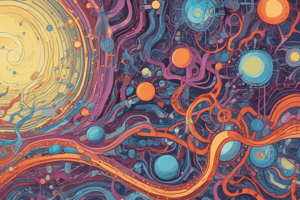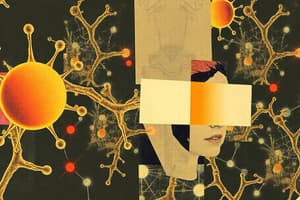Podcast
Questions and Answers
Match the communication method on the left with its property on the right.
Match the communication method on the left with its property on the right.
Autocrine signal = Chemical Cytokine = Chemical Gap junction = Both electrical and chemical Hormone = Chemical Neurohormone = Chemical Neurotransmitter = Chemical Paracrine signal = Chemical
Which of the following signal molecules are transported through the circulatory system? (Select all that apply)
Which of the following signal molecules are transported through the circulatory system? (Select all that apply)
- Cytokines (correct)
- Hormones (correct)
- Neurotransmitters
- Neurohormones (correct)
Can a paracrine signal transmit the internal signal to pounce in a cat?
Can a paracrine signal transmit the internal signal to pounce in a cat?
No
List four components of signal pathways.
List four components of signal pathways.
Name three cellular locations of receptors.
Name three cellular locations of receptors.
What are the four steps of signal transduction?
What are the four steps of signal transduction?
What happens during amplification in signal transduction?
What happens during amplification in signal transduction?
Why do steroid hormones not require signal transduction?
Why do steroid hormones not require signal transduction?
Name the four categories of membrane receptors.
Name the four categories of membrane receptors.
What is the difference between a first messenger and a second messenger?
What is the difference between a first messenger and a second messenger?
Place the terms in the correct order for a signal transduction pathway.
Place the terms in the correct order for a signal transduction pathway.
Will a cell depolarize or hyperpolarize in the following situations? (Select all that apply)
Will a cell depolarize or hyperpolarize in the following situations? (Select all that apply)
If a cell moves calcium ions from its cytosol to the extracellular fluid, which type of transport does it use?
If a cell moves calcium ions from its cytosol to the extracellular fluid, which type of transport does it use?
What effects do drugs that block leukotriene action and synthesis have?
What effects do drugs that block leukotriene action and synthesis have?
What do receptors, enzymes, and transporters have in common?
What do receptors, enzymes, and transporters have in common?
What mechanisms could explain insulin's different effects on muscle and liver cells?
What mechanisms could explain insulin's different effects on muscle and liver cells?
To decrease a receptor's binding affinity, a cell might (Select all that apply):
To decrease a receptor's binding affinity, a cell might (Select all that apply):
Flashcards are hidden until you start studying
Study Notes
Communication Methods and Their Properties
- Autocrine signals influence the same cell that produces them.
- Cytokines, hormones, neurohormones, and neurotransmitters are chemical signals.
- Gap junctions facilitate both electrical and chemical communication.
- Paracrine signals affect nearby cells.
Signal Molecule Transport
- Cytokines, hormones, and neurohormones are transported via the circulatory system.
- Neurons release cytokines, neurohormones, and neurotransmitters.
Paracrine Signals and Rapid Responses
- Paracrine signals are ineffective for rapid actions over distance, such as a cat pouncing.
- Eye and leg distance negates paracrine signaling; response time is too quick for diffusion.
Components of Signal Pathways
- Signal pathways consist of four vital components: signal molecule, receptor, intracellular signal molecules, and target proteins.
Cellular Locations of Receptors
- Receptors are located on the cell membrane, in the cytosol, or within the nucleus.
Steps of Signal Transduction
- Signal transduction involves four steps:
- Signal molecule binds to receptor.
- Activates a protein.
- Generates second messengers.
- Triggers a cellular response.
Amplification in Signal Transduction
- Amplification transforms one signal molecule into numerous second messenger molecules.
- Example: One ligand can amplify to 18 intracellular molecules.
Steroid Hormones Mechanism
- Steroid hormones are lipophilic, allowing them to cross cell membranes and bind to intracellular receptors, bypassing the need for signal transduction and second messengers.
Categories of Membrane Receptors
- Membrane receptors fall into four categories:
- Ligand-gated ion channels
- Receptor-enzymes
- G protein-coupled receptors
- Integrins
First vs. Second Messengers
- First messengers are extracellular signals; second messengers operate intracellularly.
Order of Signal Transduction Pathway
- Correct order for signal transduction:
- (a) ligand, receptor, second messenger, cell response.
- (b) amplifier enzyme, second messenger, protein kinase, phosphorylated protein, cell response.
Cell Depolarization and Hyperpolarization
- Chloride channels opening leads to hyperpolarization.
- Potassium channels opening also results in hyperpolarization.
- Sodium channels opening causes depolarization.
Calcium Transport Mechanism
- Active transport is required to move Ca2+ against its gradient from cytosol to extracellular fluid.
Drug Effects on Leukotrienes
- A drug blocking leukotriene action affects target cell receptors or downstream processes.
- A drug inhibiting leukotriene synthesis may target lipoxygenase.
Common Features of Receptors, Enzymes, and Transporters
- All are proteins, accounting for their characteristics of saturation, specificity, and competition.
Insulin's Differential Effect
- Insulin may operate through one receptor with different second messenger pathways or utilize distinct receptor isoforms to influence glucose transporter levels differently in muscle versus liver cells.
Reducing Receptor Binding Affinity
- A cell can decrease receptor binding affinity by synthesizing a new receptor isoform or withdrawing receptors from the membrane.
Studying That Suits You
Use AI to generate personalized quizzes and flashcards to suit your learning preferences.




